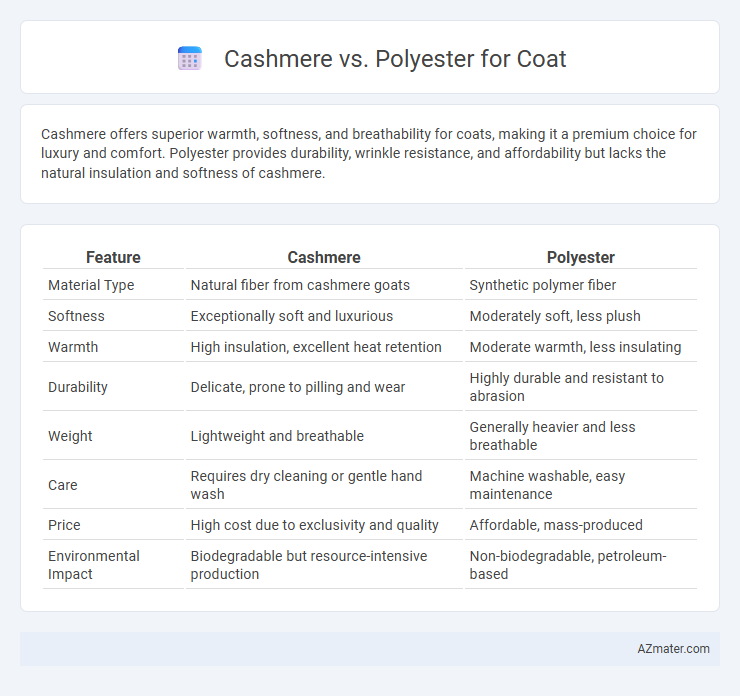Cashmere offers superior warmth, softness, and breathability for coats, making it a premium choice for luxury and comfort. Polyester provides durability, wrinkle resistance, and affordability but lacks the natural insulation and softness of cashmere.
Table of Comparison
| Feature | Cashmere | Polyester |
|---|---|---|
| Material Type | Natural fiber from cashmere goats | Synthetic polymer fiber |
| Softness | Exceptionally soft and luxurious | Moderately soft, less plush |
| Warmth | High insulation, excellent heat retention | Moderate warmth, less insulating |
| Durability | Delicate, prone to pilling and wear | Highly durable and resistant to abrasion |
| Weight | Lightweight and breathable | Generally heavier and less breathable |
| Care | Requires dry cleaning or gentle hand wash | Machine washable, easy maintenance |
| Price | High cost due to exclusivity and quality | Affordable, mass-produced |
| Environmental Impact | Biodegradable but resource-intensive production | Non-biodegradable, petroleum-based |
Introduction: Cashmere vs Polyester Coats
Cashmere coats are renowned for their exceptional softness, natural warmth, and luxurious feel, making them a premium choice for winter wear. Polyester coats offer durability, water resistance, and affordability, appealing to budget-conscious consumers seeking low-maintenance outerwear. Understanding the differences in insulation, texture, and care between cashmere and polyester coats helps in selecting the ideal garment for comfort and style.
Material Overview: What is Cashmere?
Cashmere is a luxurious natural fiber harvested from the undercoat of cashmere goats, prized for its exceptional softness, warmth, and lightweight feel. Unlike synthetic materials like polyester, cashmere provides superior insulation and breathability, making it an ideal choice for high-quality coats. The fiber's delicate texture and natural elasticity contribute to enhanced comfort and durability in premium outerwear.
Material Overview: What is Polyester?
Polyester is a synthetic fiber derived from petroleum-based products, known for its durability, wrinkle resistance, and ability to retain shape. It is lightweight, moisture-resistant, and often blended with natural fibers to enhance fabric performance in coats. Unlike natural fibers like cashmere, polyester offers greater affordability and easier care, making it a popular choice for outerwear.
Softness & Comfort Comparison
Cashmere coats offer exceptional softness and unmatched comfort due to their fine, natural fibers, which provide a luxurious, lightweight feel against the skin. Polyester coats tend to be less breathable and can feel less soft, often resulting in a stiffer texture and reduced comfort during extended wear. The moisture-wicking and temperature-regulating properties of cashmere enhance overall comfort, whereas polyester's synthetic composition may cause overheating or discomfort in varying climates.
Warmth & Insulation Properties
Cashmere offers superior warmth and insulation due to its natural fine fibers that trap heat efficiently while remaining lightweight and breathable. Polyester, a synthetic material, provides decent insulation but tends to retain moisture, reducing its thermal effectiveness in cold conditions. For optimal cold-weather performance, cashmere coats are preferable for their cozy warmth and natural temperature regulation.
Durability & Longevity
Cashmere offers superior softness and warmth but requires careful maintenance to preserve its delicate fibers, making it less durable for heavy daily wear. Polyester coats boast high durability and resistance to wrinkles, stains, and shrinking, ensuring long-lasting performance with minimal care. For longevity, polyester is ideal in rugged conditions, while cashmere excels in luxury appeal but may show wear faster without proper handling.
Care & Maintenance Needs
Cashmere coats require gentle care, including dry cleaning and careful storage to avoid pilling and damage, while polyester coats offer easier maintenance with machine washable options and high resistance to wrinkles and stains. Cashmere's natural fibers need protection from moisture and moths, making periodic professional cleaning essential, compared to polyester's durability and low sensitivity to environmental factors. Choosing between cashmere and polyester for coats involves weighing the luxury and softness of cashmere against the practicality and convenience of polyester's straightforward care.
Cost & Value Considerations
Cashmere coats typically command higher prices due to the natural luxury fiber's softness, warmth, and durability, offering long-lasting value despite the initial investment. Polyester coats provide a more budget-friendly option with lower upfront costs, but they may lack the breathability and insulation quality of cashmere, potentially reducing lifespan and comfort. When considering cost versus value, cashmere's premium durability and comfort often justify the price, whereas polyester suits those seeking affordability and easy maintenance.
Sustainability & Environmental Impact
Cashmere coats offer natural biodegradability and renewable fiber benefits but face sustainability challenges due to high water usage and overgrazing by goats, leading to land degradation. Polyester coats, derived from non-renewable petroleum, contribute to microplastic pollution and have a significant carbon footprint from production and disposal. Choosing recycled polyester or sustainably sourced cashmere can mitigate environmental impact while maintaining performance.
Conclusion: Which Coat Material is Better?
Cashmere coats offer superior warmth, softness, and natural breathability, making them ideal for luxurious, comfortable winter wear. Polyester coats are more affordable, durable, and resistant to wrinkles and moisture, providing practical benefits for everyday use. Choosing between cashmere and polyester depends on prioritizing either premium comfort and insulation or cost-effectiveness and easy maintenance.

Infographic: Cashmere vs Polyester for Coat
 azmater.com
azmater.com